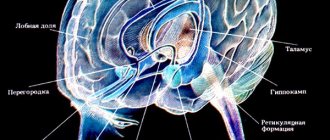The meaning of the word "psychology"
psychology
1. scientific discipline that studies the processes and patterns of mental activity ◆ Psychology
, which is not based on physiology, is just as untenable as physiology that does not know about the existence of anatomy.
N. G. Chernyshevsky, “Essays on the Gogol period of Russian literature”, 1856 (quote from NKRY) ◆ For explanation, let us take here the gradation of human abilities so often cited as an example (it is known that the science of psychology
, not content with calling human abilities human, also divides them into higher and lower).
M. E. Saltykov-Shchedrin, “Modern Ghosts”, 1863 (quote from NKRY) ◆ For some time now he began to subscribe to books on physiology, psychology
and pedagogy and, with his usual energy, began to study everything that science gives in relation to the mysterious growth and development of the child's soul. V. G. Korolenko, “The Blind Musician”, 1886-1898
2. an academic subject containing the theoretical foundations of a given scientific discipline ◆ But he still did not listen to me, and, to my surprise, a great variety of all sorts of alphabet books began to appear in our apartment, among which, however, there was some kind of psychology
, probably also intended for Olga.
M. E. Saltykov-Shchedrin, “Brusin”, 1847-1848 (quote from NKRY) ◆ Physiology and psychology
, or, perhaps, anthropology, go hand in hand, and both form, or at least should form the basis the art of education, which, as Pestalozzi puts it, takes the whole person, his body and his soul. K. D. Ushinsky, “On nationality in public education”, 1856 (quote from NKR)
3. the totality of mental processes in the conditions of certain types of activity, a certain state ◆ Let’s forget who is a secular person, who is a merchant or tradesman, who is a peasant, we will consider everyone simply people and judge everyone according to human psychology
, not allowing himself to hide the truth from himself for the sake of the peasant title.
N. G. Chernyshevsky, “Isn’t this the beginning of a change?”, 1861 (quote from the NKR) ◆ For better or for worse, they tried to enter into local life, into the psychology
of the American, looking for in him those traits that distinguish him from a European.
D. V. Filosofov, “The End of Gorky”, 1907 (quote from NKRY) ◆ The essence of one of the main camp methods is to instill in an adult the psychology
of a child. M. Maksimov, “Overcome the camp within yourself” (1992) // “Capital”, Soviet weekly socio-political magazine. — Issue No. 22 (80). — May 1992 (quote from NKR)
Phraseologisms and stable combinations
- engineering psychology
mass psychology
What is psychology?
Psychology (“psyche” - soul, “logos” - teaching, science) is a word of Greek origin that literally means “the science of the soul.” This is the basis for the well-known definition, according to which psychology is the science of the psyche.
In general this is correct, although some clarification is required.
In modern public consciousness, the words “soul” and “psyche” are actually synonymous: scientific psychology prefers to use the term “psyche,” religious thinkers and some philosophers talk about “soul.”
The word “psychology” has many meanings. In everyday language, the word “psychology” is used to characterize the mental make-up of a person, the characteristics of a person, a group of people: “he (they) have such a psychology.”
Here, activity and knowledge are fused together, driven by the need to understand another person and anticipate his actions.
The source of knowledge about the psyche in pre-scientific psychology is: 1) personal experience (everyday generalizations that arise as a result of observing other people and oneself); 2) social experience (ideas, traditions, customs that are passed on from generation to generation). The concepts of pre-scientific psychology coincide in their content with linguistic meanings.
Rogovin emphasizes that the very essence of pre-scientific psychology corresponds to a method of explanation called “explanation from the standpoint of common sense.” Pre-scientific psychological knowledge is unsystematized, unreflected, and therefore is often not recognized as knowledge at all. In pre-scientific knowledge, correct ideas can coexist with erroneous generalizations and prejudices.
Philosophical psychology is knowledge about the psyche obtained through speculative reasoning. Knowledge about the psyche is either derived from general philosophical principles or is the result of reasoning by analogy. Philosophical knowledge about the psyche is usually organized in accordance with certain initial principles.
Compared with pre-scientific psychology, which precedes it and, especially in the early stages, has a great influence on it, philosophical psychology is characterized not only by the search for some explanatory principle for the mental, but also by the desire to establish general laws to which the soul must also obey, just as all natural elements obey them.
Scientific psychology arose relatively recently - in the second half of the 19th century. Usually its appearance is associated with the use of the experimental method in psychology. There are undoubtedly some reasons for this: the “creator” of scientific psychology V.
Wundt wrote that if the physiological psychology he developed is defined by method, then it can be characterized as “experimental.”
In addition, Wundt himself repeatedly emphasized that experimental psychology is not the whole of psychology, but only part of it. Although the 19th century gave many examples of the successful use of the experimental method; enough time passed before psychology became a truly experimental science.
Knowledge in scientific psychology has an empirical, factual basis.
Facts are obtained in a specially conducted study, which uses special procedures (methods) for this purpose, the main ones being targeted systematic observation and experiment. The theories constructed by scientific psychology have an empirical basis and are (ideally) subject to comprehensive testing.
Practical use
Today, the subject of study of this science is hundreds of different areas. Of course, the basis for all is general psychology. But recently, not so much independent directions have appeared in it, but a synthesis or merger with other sciences (medicine, engineering, pedagogy, sociology, etc.). Understanding the question “what does psychology study” makes it possible for it to be widely used. When introducing new methods and technologies (for example, when teaching at school), psychology takes into account the characteristics of the age of children, the correct distribution of loads, so as not to overwork the delicate psyche. Psychologists help resolve conflicts in enterprises and sometimes contribute to the implementation of training to better prepare staff. There are also family psychologists who are engaged in saving relationships or helping to survive a separation or divorce. Managerial psychology
deals with leadership by studying what personality traits make a person stand out from the crowd.
Psychiatry
— A.B. Smulevich. Glossary of terms (depression in general medicine). M.: Medical Information Agency, 2001
— V.M. Bleikher, I.V. Crook. Explanatory Dictionary of Psychiatric Terms, 1995
— Glossary, Clinical psychology: Educational method, complex for teachers and students of psychology departments / V. N. Kosyrev; 2003
— Glossary. DSM-5 Psychological Terms and Definitions. American psychiatric association
— Zhmurov V.A. Great Encyclopedia of Psychiatry, 2nd ed., 2012
— Classification of mental disorders ICD-10. Research diagnostic criteria
— Classification of mental disorders ICD-10. Clinical descriptions and diagnostic guidelines
- Clinical psychology. Dictionary, ed. N.D. Tvorogova. Psychological Lexicon
— Brief dictionary of psychiatry, 2002
— L. Balabanova. Forensic pathopsychology (terms of the book), Stalker Publishing House, 1998. - 432 pp.
— R. Comer. General psychology: glossary
— Dictionary of psychiatric terms (psychiatry.ru)
— Directory of neurologist and psychiatrist Ed. Grashchenkov, N.I.Snezhnevsky, A.V., 1965
— T.B. Fadeeva. Mental and nervous diseases: a doctor's reference book. Mn.: Modern writer, 2002
— Terminological glossary of the main terms of dynamic psychiatry Ed. V.A. Shapovalova
In the dictionary D.N. Ushakova
PSYCHOLOGY, psychology, many others. no, female (·Greek psyche - soul and logos - teaching) (book). 1. Science that studies mental processes that arise as a result of the constant influence of the objective world and the social environment on humans (and animals). Experimental psychology. Animal psychology. 2. The set of mental processes that determine this or that type of activity. Psychology of creativity. Psychology of acting. 3. Psyche, mental structure, a set of mental inclinations and habits. A person with an unusually complex psychology. Child psychology.
In the Encyclopedia Dictionary
(from psychology... and...logy), the science of the patterns, mechanisms and facts of the mental life of humans and animals. The main theme of psychological thought in antiquity and the Middle Ages is the problem of the soul (Aristotle, “On the Soul”, etc.). In the 17th-18th centuries. On the basis of mechanistic philosophy, a deterministic approach to the psyche emerges. All R. 19th century At the intersection with physiology, experimental psychology (psychophysics, psychophysiology, etc.) arises. In the 1870-80s. is emerging as an independent discipline, distinct from philosophy and physiology. In line with the ideas of neo-Kantianism, a dualistic concept of “two psychologies” arose - natural scientific and cultural-historical (see Understanding Psychology). The main trends in psychology of the 20th century. — Gestalt psychology, behaviorism, psychoanalysis; in the beginning. 1960s Humanistic psychology and cognitive psychology have developed (mainly in the USA). Branches of psychology: psychophysiology, zoopsychology and comparative psychology, social psychology, child psychology and educational psychology, developmental psychology, occupational psychology, creativity psychology, medical psychology, pathopsychology, neuropsychology, engineering psychology, psycholinguistics, ethnopsychology, etc.
Psychology of words
Women's magazine » Psychology of women
Everyone knows the popular proverbs: “A word is not a sparrow; if it flies out, you cannot catch it” or “You can kill with a word” and many others. As a rule, folk wisdom is always right
So here, the importance of the spoken word, its specificity, sound and vibrations were studied not only by philologists, but also by physicists, mathematicians, chemists, doctors and, of course, psychologists
Non-traditional sciences and extrasensory specialists, priests, metaphysicians, hypnotists, etc. also took part in similar experiments. And they all came to one common opinion: “The word is great power.” All words contain a certain amount of information and emotional connotation, so they can affect both positively and negatively.
So how can a word affect a person’s psyche? What is more important: what to say or how to say it? There was such a case in psychological practice. A fairly mature woman, who had already established herself as an individual, as the wife of a successful businessman and the mother of a small child, asked for help. The fact is that it was difficult for her to find a common language with others.
From a very early age we hear words. It is not surprising that each word contains a huge amount of information. But these combinations of letters have another specific feature - an emotional connotation. Remember those words that make you feel good in your soul, make you want to smile, and pleasant associations arise.
But there are also those that cause sadness, aggression, and sometimes despair. Now let's go back to the example. In a conversation with a woman, the psychologist noted that the content of her story in itself may not carry anything bad.
But what words did she use to describe her life situation! While narrating the situations, too many words with a negative emotional connotation and words with the particle “not” were heard. In addition, she very often used exaggeration in her speech. For example, words such as “I hate”, “I would kill”, “I want to destroy” were constantly heard.
It is not surprising that nearby people begin to have headaches or develop a general unpleasant state of health. Children and overly emotional people can be especially sensitive to this. You can and should watch what words you use. The easiest way: record your long conversations (telephone, with friends, partner or child) several times on a voice recorder.
After listening to the recordings, pay attention to the connotation of the word (positive or negative), which words you repeat more often and write them down. And then it’s hard but productive work
Try to reformulate every word you hear and record into one that does not differ in content, but is psychologically opposite in form. It's very simple.
For example, instead of the words “don’t be sick” you can say “be healthy”, the words “catastrophe” or “problem” can be replaced with “difficult situation”. So, gradually, you will be able to compile a whole list of words that are in your vocabulary and “spoil” your conversation. Let's say more, incorrectly chosen, thoughtless words can greatly influence the interlocutor.
Ask your loved ones to help you and correct you at the right time. When you want to use an “old negative” word in a conversation, remember its “positive replacement” and pronounce it. Gradually you will succeed
What happened to the woman from the example? While working with a psychologist, she managed to learn to pay attention not only to the essence of the conversation, but also to its form of construction. Now this woman enjoys communicating with family and friends
She also noticed that her relationship with her son and husband had become closer.
Everyone can improve their speech, you just need to work a little on yourself. Enjoy your communication!
Discussions on the forum
:
Good:
Good article. Thank you!
from: Alexander ():
Tell me, where can I read such literature in more detail?
Peter:
nothing new, in the Bible and in more detail and with practical examples.
Sergeevna:
I really liked the article. I read straight into every word and thought about it. I became very interested. I would also like to know where I can read more information on this topic.
Nikolay:
Useless article. Not particularly useful in practice.
Alexander:
Nikolay, you need to replace the phrase “useless article” with “the article does not suit me”, the phrase “not particularly useful in practice” with “it’s difficult for me to understand what this article is saying.”
Similar words
PsychologistPsychologistPsychologismPsychologicalPsychologicalPsychologicalPsychologicalPsychologicalWork PsychologyPsychologizeChildren's PsychologyPsychologizationPsychologicalPsychologyofAgingPsychologyDepthPsychologySocialPsychological SchoolEngineering PsychologyAge PsychologyAviation PsychologySpace PsychologyMedical PsychologyPsychological JournalPsych Institute of RASPsychology "objective"Psychological profileAssociative psychologyAnalytical psychologyPsychological school of lawIndividual psychology Adler
What is psyche
A person not only exists in the world, but constantly interacts with it. And for this you need a tool. Psyche is the ability of the brain to analyze and synthesize information that comes from the environment through the senses, and respond accordingly to it. An example of its action is receiving sensations, an emotional reaction to current events. That is, it is an interaction tool. Temperament, character and abilities also depend on the individual characteristics of mental work. This also applies to what psychology studies.











